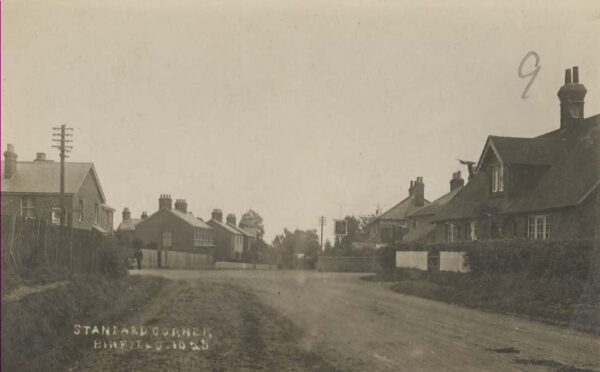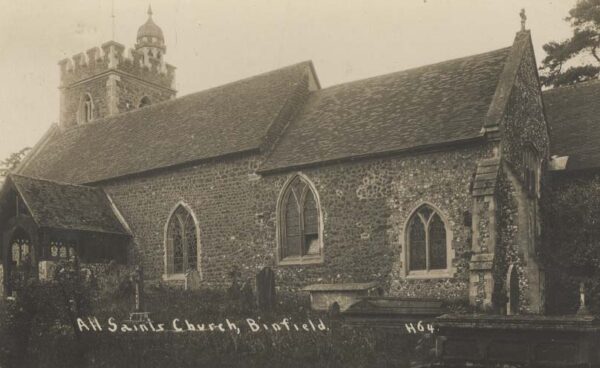Mr John Jones was born in Hurst in August 1845, the second son of Catharine and Joseph Jones who was a master butcher employing one man. In the 1851 census the family, now increased by John’s younger brother and sister, had moved to Binfield where Joseph’s brother already owned Angell Place – later renamed Binfield Place.
John was to spend the rest of his long life in Binfield. He was educated at the private school that Mr Collins had established at Binfield House and by 1861, when he was sixteen, had joined his elder brother, David, in their father’s butcher’s business. The family had one live-in servant.
On October 26th 1870 when he was twenty-five, John married Julia Green, the daughter of William Waterman Green, at Waltham Abbey. By the time of the 1871 census, the newlyweds had moved into Park Cottage, Terrace Road, Binfield. John was still working with his father but by 1881, ten years later, he could describe himself as a Master Butcher and Dairyman, and was now living on the Forest Road with his wife, a family of three daughters, aged 9, 5 and 1 and one 50 year-old live-in servant. Another daughter, Ellen, born after the 1881 census had died in 1883.

John’s wife, Julia, died in 1889 and the 1891 census lists John still on the Forest Road, now a widower, with his daughters, Julia and Emily and his brother, Richard, also a butcher. Julia is acting as John’s bookkeeper and another butcher and a family servant are also resident. It seems that, by then, John had taken over the family business from his father. His elder brother, David, also living on the Forest Road, was by then in business as a florist.
By the time of the first Parish Council ballot [see the June 2021 issue of the Berkshire Family Historian] at the end of 1895, John had already spent 50 years of his life in Binfield. His butchery and dairy businesses kept him in touch with his fellow villagers, so it must have seemed appropriate to offer himself for election. Elected second in the eventual poll, John was, on January 4th 1895, the first councillor to sign the “Members Declarations on Acceptance of Office”1 at the first Council meeting, which also elected Binfield’s rector the Reverend Savory as Chairman, John Jones, vice Chairman, and appointed William Bullock Webster as its clerk. William Minchin, another elected councillor, was the third member to declare acceptance of office, a declaration witnessed by the Reverend Savory. So began the first Binfield Parish Council meeting – a truly historic moment in the village’s history.
In the 1901 census, John, still a widower but now living at the Dairy Farm, Forest Road, Binfield, is listed as a “butcher and “c” (“c” = councillor?) with his daughters, Julia, still his book-keeper, Alice J and Emily still at home. There were no live-in servants or other butchers living in.
The Rector did not seek to retain the Chair after the first year of the Council and John Jones was elected in his place. He then served on the Council continuously until the 1936/37 council when he only attended the first meeting of the year. He was then 90 years old so he may have been suffering from failing health.
Furthermore, in this chronological marathon, Mr Jones chaired the Parish Council for 28 of his 40 years as a councillor until 1925 when he was narrowly defeated. The Minutes of the April 17th 1925 meeting curtly mark the end of his reign. They show that he was proposed as Chairman by William Minchin, a parish councillor who had served continually with him since 1895, and seconded by John Barker. But two newer councillors, Messrs Harte and Fielden proposed an alternative – Mr Munday Bolton. The full complement of nine councillors in attendance at the meeting and nine votes were cast. So all voted. The result was a 5-4 victory for Mr Munday Bolton. Assuming Mr Jones had voted for himself, only one of the three newer members – Messrs W J Green, G Bolton and C B Davies – had supported Mr Jones. Just a whiff of a “parish coup” against the “old guard”?
As well as being a councillor for so long, Mr Jones had served the village in many other ways.
There exists a labelled photograph of the members of the Binfield Sports Committee taken “c. 1900” [as estimated on a handwritten list of names attached to the photo]. Ironically, Mr Jones is seated in front of nine other standing men but alongside Mr Munday Bolton, the successful candidate over twenty years later in the contest for the Parish Council Chair. The Sports Committee was responsible for organising the annual sports meeting in the village, mainly athletics, but with other amusements included. Mr Jones served the annual event long and well. In 1901 it was held on his land, in 1913 he was “clerk of the course”. Onset of war caused the 1914 meeting to be cancelled, and there is no press record of a revival meeting after the war.
Mr Jones had also been “chairman of celebrations in connection with the Royal family” – unspecified dates and events though there must have been several to arrange – notably a jubilee, at least three royal funerals and possibly three coronations.
And by 1907 he had become Chairman of the Binfield Working Men’s Club, seemingly presiding until at least 1920; later, he became Treasurer, a post he held till 1937. By 1909 he was Treasurer of Binfield Football Club. And at some time, he was also a parish representative on the Easthampstead Rural District Council.
The 1911 census lists him as living at Murrell Hill Farm Binfield as a butcher and farmer. Alice, now his only resident daughter, is employed as his clerk. They have one live-in servant. But Mr Jones’ tenancy was soon to come to an end. In September of the same year, a press notice announced that “Mr Jones instructs Thimbleby and Shorland to put Murrell Hill Farm stock up for auction, the farm having previously been sold.”
World War 1 then intervened, creating further tasks for Mr Jones and the Council. In May 1916, in response to a national memo from the Board of Agriculture, he was chosen to lead a group set up to control the number of rats and sparrows affecting the storage of food supplies in the village. In wartime this was a significant issue. Hunger was a concern because of the threat to merchant shipping. In 1916, he was Chairman of the jumble sale committee to raise money for a European Agricultural Relief Fund.

After the war he remained active in his more general village interests as a church sidesman and a school manager. In October 1920, he presided over a quarterly meeting of the Binfield Club; he served on the committees of both the Cricket (he was a vice-president) and the Football Clubs; throughout, he competed in the autumn Agricultural Association competitions; he was regularly a judge and exhibitor at the Royal Forest Fat Stock Show, held each December and, as the account of his funeral records, he was considered especially “one of the shrewdest” buyers. In 1930, Mr Jones decided to retire from business. On May 9th 1939 he died, aged 93, at “The Homestead”, almost certainly (part of?) the dairy farm he had been working since before the 1901 census. He had given a large part of his life to service to the village, and he deserves to be remembered.
There is a press report of his life in the Reading Mercury eulogy of September 8th 1939 which confirms much of the material I have used in this article. Relevant censuses and the Reading Mercury’s report apart, all the documents referred to are held at the Berkshire Record Office. This acknowledgement is coupled with my thanks for the excellent advice and practical help the Record Office staff provided during my visits.
